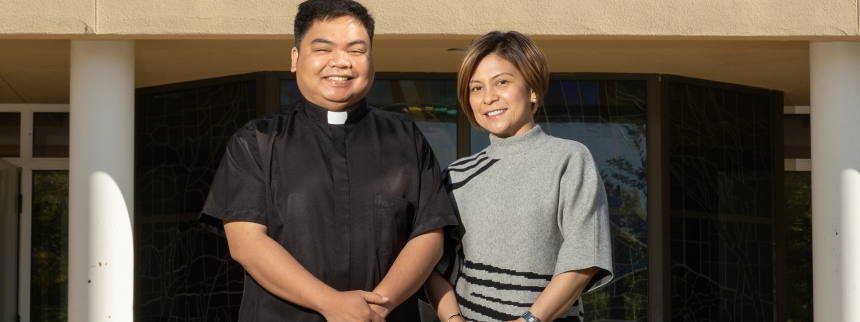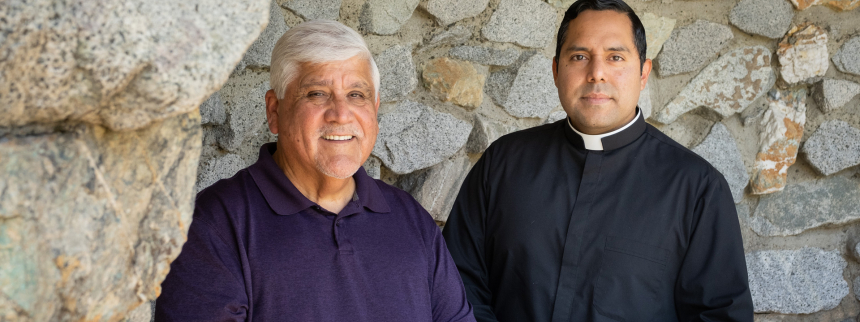
Convocation of Parish Pastoral Councils continues journey toward collaboration between clergy and laity
As chair of the Diocesan Pastoral Council (DPC), Adam Bowers envisions a significant role for the laity with their pastors in shared responsibility and accountability through developing strong parish pastoral councils.
“The essence of the idea is that all of us are being called by the Church to holiness,” says Adam, who has served on the DPC since 2016 and is a member of Sacred Heart Parish in Gridley for the past 12 years. “As laity, we have a role to play in the Church in pursuit of her mission and we understand very well as Catholics that we belong to a hierarchical structure beginning from the time of the disciples.”
“The laity bring to the table their own backgrounds and experience and may have an edge on knowledge in some areas, offering valuable collaboration with clergy in the making of decisions, and determining the actions and programs of each parish,” adds Adam, who is a candidate for the permanent diaconate in the diocese.
“Just as Bishop Jaime Soto values the Diocesan Pastoral Council because of the consultation and collaboration it affords him, there is a vision of that model being applied consistently in parishes, so that pastors can get advice, collaboration and support from the pastoral council, who are leaders of their respective communities.”
Adam moderated the first-ever “Come to the Table” virtual convocation of parish pastoral councils on April 17, focusing on co-responsibility, accountability and building strong councils. Bishop Soto convened pastors, parochial administrators and their parish pastoral council members. Ninety-three out of 102 parishes in the diocese participated, with 443 participants, including priests, deacons and laity.
Bishop Soto called the convocation to bring together the leadership of the parishes in the diocese in order to promote a greater communion of life in the local church. The convocation, he said, “begins the journey toward a more dynamic and intentional conversation and cooperation among clergy and laity so that we can deepen our communion with the Lord Jesus.”
During the convocation, Bishop Soto offered reflections on his new pastoral letter, “Call to Holiness.” Kathy Conner, then-Chancellor of the Diocese, presented a session on “How to Build a Strong and Effective Parish Pastoral Council.” Participants joined in with various questions and the bishop’s concluding remarks addressed “the path forward.”
Adam says the convocation evolved out of discussion at the DPC that all pastoral councils “should be building a culture of consultation and trust, and also offered guidelines and resources.” The convocation “is a way to have pastors, parochial administrators, and parish pastoral council chairs and members become energized and renewed. We want to be of service to all pastoral councils.”
From this process, Adam hopes that parishes can identify how laity can be supported in their mission to evangelize. “We envision that parish mission belongs not just to a select few, but that each of us engaged in parish work receives opportunities to answer our own calls to mission.”
He hopes that the understanding of the role of the laity in the Church continues to evolve so that there is a greater sharing in the accountability that now rests mainly on the pastor. “Most Catholics understand that it is the pastor being praised or blamed for what happens in the parish. But we owe it to our pastors to adjust our expectations as they lead our parishes, and actively find ways to work as partners with them, shouldering more of the accountability and responsibility for our parish initiatives. The dynamics of the ‘old days’ don’t exist anymore. Only our largest parishes in the Diocese even have more than one priest. So it’s not feasible or practical to expect our priests and pastors to be fully accountable for everything in the parish anymore.”
Serving with Adam on the planning committee for the convocation which will reconvene in the fall are Tim Conner of St. John the Baptist Parish in Folsom, Emilia Jankowski of Sacred Heart Parish in Sacramento and Terry Dugan of St. John Vianney Parish in Rancho Cordova, and Bryan Visitacion, Diocesan Director of Media and Communications. Parish pastoral councils will gather again in person on Oct. 2 at St. James Parish in Davis and Oct. 16 at Our Lady of Mercy Parish in Redding for workshops and expanded resources, and the important networking opportunities that are missing from virtual gatherings.
“It was encouraging to see everyone on April 17 so engaged and participating,” Adam notes. “We have a diocesan team that is focused and committed to keeping that energy and having it grow, so we can do something with this rather powerful start.”
Inspired by Bishop Soto’s pastoral letter, “Call to Holiness,” each parish pastoral council was provided resources and agendas following the convocation, and tasked with choosing three to four agenda items to work on over the next six months.
The pastoral letter “deals with many scriptural themes, but provides a foundation for creating a roadmap of how to move into an effective setup for pastoral councils,” says Adam, an attorney for the past 20 years with the Grasso law firm in Chicago. He and his wife, Dr. Maralee Bowers, have five children.
“We don’t see a lot of communications to laity and clergy from our bishops that provide real, substantive initiatives to work on. They usually tend to reflect on the spirit of a question and provide some guiding principles. I thought the bishop’s decision to provide concrete suggestions for councils working through the materials was inspired on his part and will help drive a lot of the discussion going forward.”
Parishes should not feel “overwhelmed” by the bishop’s objectives offered in “Call to Holiness.” “They should feel heartened that they have a certain flexibility to look at their own circumstances and capabilities,” Adam says. “Pastoral councils are doing this now with their pastors to discern what makes the most sense for their parishes. This is the beginning of a reinvigorated process that will continue for some time. If parishes go through this first round and find it fruitful, they can return back to the objectives again if they wish.”
The path forward looks bright, he says, noting that 90 percent of parishes participated in the convocation. “There seems to be good enthusiasm by all, so whatever challenges remain, the hope is we can all work together to overcome them. We see a horizon that has many things ahead that are all hopeful and promising. There’s a depth to what we are doing that we hope offers people inspiration and a chance to keep coming back and continuing this work together.”
What is a Parish Pastoral Council?
The Diocese of Sacramento requires every parish to establish and maintain a parish pastoral council.
The pastor identifies his parish pastoral council and presides over the council, which serves in an advisory capacity. The parish pastoral council assists the pastor in serving the parish community by exploring the needs of the parish and responding appropriately. This is accomplished through prayer, listening and dialogue.
The pastor determines the size and membership of the council through a selection process of his discretion. Structure of the council is formalized through bylaws with an elected chairperson and a regular meeting schedule.
To view the parish pastoral council guidelines, visit www.scd.org/diocese-sacramento/diocesan-mandated-councils
Reflections on 'Call to Holiness' and the path forward
Father Arnold Parungao, former pastor, St. Robert Parish, Sacramento
Bishop Soto’s pastoral letter, “Call to Holiness,” enabled me to realize once again our identity and mission: “to be the salt of the earth and the light of the world.” This is truly being a missionary disciple of Jesus. If you look into it carefully, you will be able to find the connection between what Jesus did 2,000 years ago and what we can do as Jesus’ disciples today, in the midst of this pandemic.
There will be challenges and hindrances moving forward. Thankfully, Bishop Soto gave us two disciplines we have to practice: co-responsibility and accountability. As members of the body of Christ, we are to look out for and care for one another. This is not a one-man job. It is the collaboration of clergy and laity alike and it starts with the pastoral council. We are to realize that we are instruments of the love and mercy of God that we received.
Rosielyn Pulmano Thompson, pastoral council chair, St. Robert Parish, Sacramento
“Call to Holiness” offers a poignant reminder of how the example and grace of Jesus Christ will allow us to “transition” back into parish life. “If we are to truly serve our parish, the membership of the Pastoral Council should reflect the diversity of our community.” This suggestion should apply to all ministries of the church. All parishes should evaluate whether our ministries or our church organizations reflect the diversity and offer equity for membership.
Many of us felt so much emptiness because we could not go to Mass, could not receive Christ through Communion, nor attend funerals for our dearly departed. Now more than ever, many of us have realized how important our church is and how our faith in Jesus is the one guarantee we have to get through this pandemic. We need to figure out how to harness these feelings, even longings, and “rebuild” our parishes into ones that encourage, motivate, understand and meet the needs of our communities and make us feel that sense of belonging.
Father Alvaro Perez, PES, pastor, St. Lawrence Parish, North Highlands
Months ago I was thinking about the Church’s “comeback” to ministry, because communication is always a challenge to diverse communities and it will require a strong gesture to announce it. The convocation — the way I read it — is the kickoff to the great comeback of the faithful to worship and to ministry in the Church.
“Call to Holiness” is right on target. One concern is always, how do we make a sustainable improvement? The answer is to go to the root and core. Our vocation to holiness is the core of our mission. Everything springs from there.
We will have a process of discernment and listening. It is important to delineate a vision, but even more important to make an examination of conscience as a parish community. Sometimes we get excited about where we want to go, but it is equally important to begin with a simple question: “Where are we?” It is an opportunity to bring back what has worked and rethink what needs more work.
Paul Mendoza, pastoral council chair, St. Lawrence Parish, North Highlands
We have the opportunity to use the initiatives from Bishop Soto in “Call to Holiness” as the common focus for all of us. They draw us to the center of why we as Catholics put all of our energies toward helping each other. The notion of hospitality is primary and we must build that into all our ministries and Masses. The main question for us will be how we engage our parishioners, not just those coming to Mass on weekends.
We’ve been given a template and now we have the opportunity to localize it to meet the needs of our community. All of us must be the hands, the feet and the heart of Christ. We must encourage parishioners to consider volunteering in parish ministries where they can be engaged in answering their missionary call.



